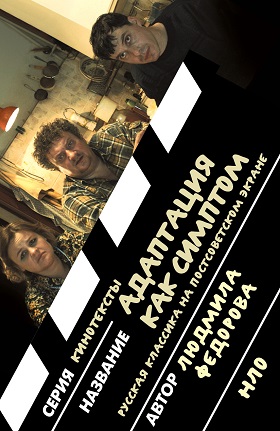
 We are delighted to have Professor Lioudmila Fedorova sharing with us about her latest book — Adaptation as Symptom: Russian Classics on Post-Soviet Screen (Moscow: New Literary Observer, 2021). The book has been published in Russian, and its Russian abstract and preview can be read on the publisher’s website.
We are delighted to have Professor Lioudmila Fedorova sharing with us about her latest book — Adaptation as Symptom: Russian Classics on Post-Soviet Screen (Moscow: New Literary Observer, 2021). The book has been published in Russian, and its Russian abstract and preview can be read on the publisher’s website.
Adaptation as Symptom: Russian Classics on Post-Soviet Screen provides a new theoretical framework that interprets contemporary film adaptations of Russian classical literature as a litmus test for deep social and political changes in post-Soviet Russia. The study shows that the turn from a period of liberalism and democratic institutions to a new era of authoritarianism in Putin’s Russia was prepared by national mass-media and, in particular, by adaptations of literature, long before it materialized in the form of policies.
In the 1990s, after the collapse of the Soviet Union, the directors of adaptations took an active role as interpreters of powerful literary “originals.” They ironically deconstructed classical texts and engaged in dialogue with their authors, yet, in the long run, demonstrated the relevance of literary classics for the modern day. In the 2000s, TV series became the most popular genre of adaptations. In the majority of them, directors function merely as transparent mediums, conveying the meaning of the literary source as precisely as possible. Adaptations cease to be creative interpretations or parodies and turn into illustrations of the text. While the earlier ironic adaptations appealed to certain audiences, the new ones target the nation as a whole. Any attempt to release a deconstructing, non-reverent adaptation provokes heated discussions in the press and becomes fodder for officially appointed critics. It is especially ironic that many of the texts recognized today as part of the national cultural heritage were prohibited in the Soviet Union until perestroika, but are now, retroactively, being included in the pantheon of Russian and Soviet classics, contributing to the nostalgic image of “the Russia we have lost.”
In Adaptation as Symptom, Professor Fedorova applies the findings of trauma studies to the theory of adaptation and interpret multiple film adaptations of the same classical text as a symptom of a socio-historical trauma, similar to multiple repetitions of the same post-traumatic narrative, typical for a trauma survivor. Moreover, the classical texts provide the expressive means of productive work with the historical trauma. In the context of contemporary Russia, the traumatic events the adaptations react to are the historical breaks marking the beginning and the end of the Soviet period. For example, Sergei Soloviev’s adaptation of Chekhov’s Three Sisters (1994), seemingly close to the original, is suddenly interrupted by an intertitle, a quotation from Solzhenitsyn’s The Gulag Archipelago, claiming that if Chekhov’s heroines could have known the tortures of Soviet labor camps that took place some thirty to forty years later, all of them would have ended in a psychiatric ward, and none of Chekhov’s plays would have been finished. Thus, in contemporary adaptations, the Soviet period serves as a testing tool for Russian classical literature, and in the 1990s directors welcome its end. However, a decade later, Soloviev perceives the end of the Soviet period as a traumatic event, and in his dilogy 2–Assa–2 (2008) and Anna Karenina (2009), portrays the tragic break with universal cultural and ethical values that have characterized both the pre-Soviet and the Soviet periods.
Interested in reading Adaptation as Symptom: Russian Classics on Post-Soviet Screen?
Find buying/reading options here.